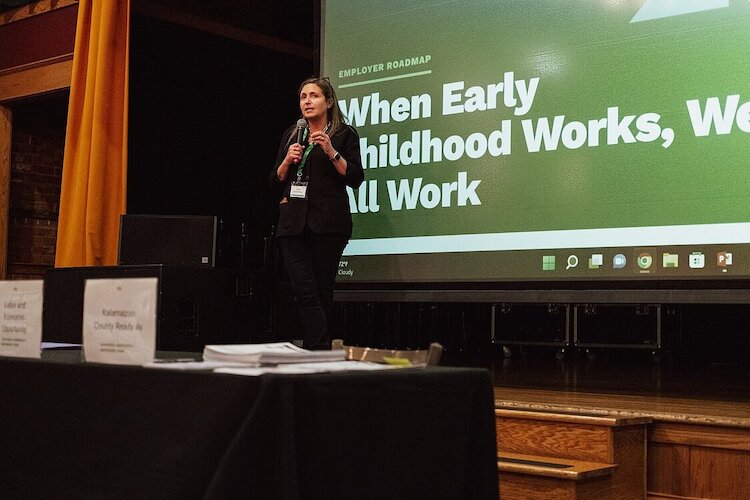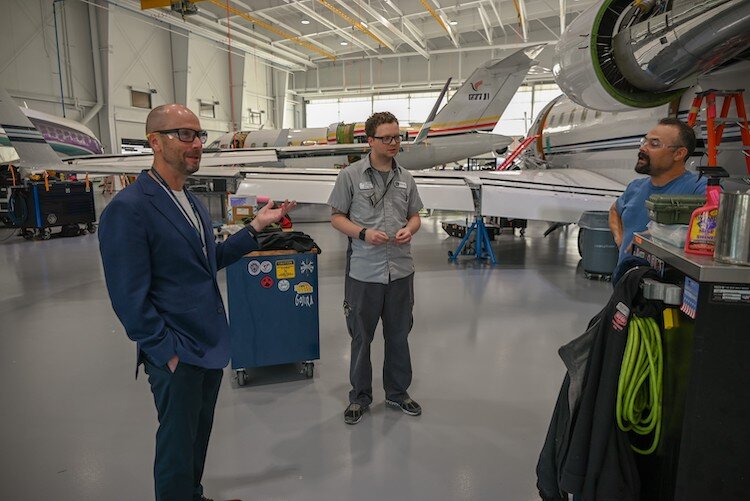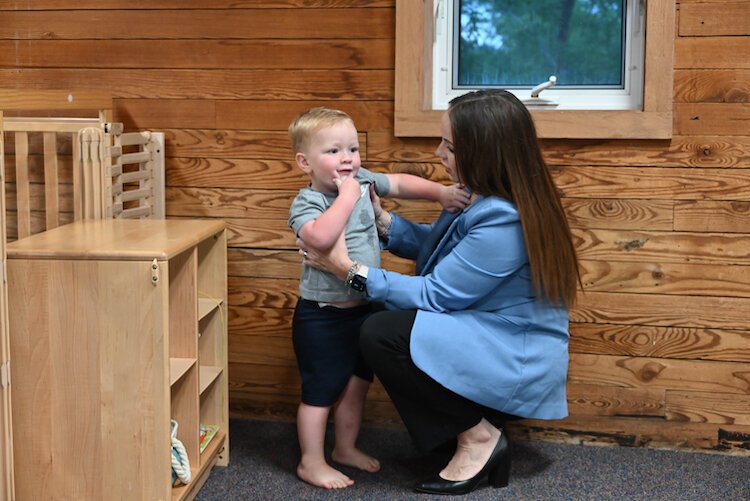Duncan Aviation in Battle Creek working to find solutions to team members’ childcare needs
“There is a bigger movement afoot. We can and must simultaneously support today’s workforce while working to change the system that is holding these childcare problems in place.”
Editor’s note: This story is part of Southwest Michigan Second Wave’s On the Ground Battle Creek series.
BATTLE CREEK, MI —Duncan Aviation in Battle Creek may soon be as well-known for the solutions it is coming up with to address the childcare needs of its workforce, as it is for being among the world’s top-ranked business jet service providers.
A report issued On July 23 by Pulse, a project of the W.E. Upjohn Institute for Employment Research, highlights the jet service provider’s responsiveness to its team members in a holistic way that boosts talent retention and attraction efforts while simultaneously supporting the local early learning and care sector.
“The lack of reliable, high-quality child care in our local area prevents many would-be job seekers from entering or re-entering the workforce after they have started a family,” said Andy Richards, executive vice president, and chief operating officer at Duncan Aviation’s Battle Creek facility, during testimony at a joint hearing in Lansing in March of Michigan’s Labor and Economic Opportunity Appropriations Committee and the House Labor Committee on the issue of the child care crisis and its impact on labor.
“In addition, those current team members with young families may not be able to fully engage and focus while they are at work if they are constantly worried about who is taking care of their young kids. It can be a matter of productivity loss due to distracted workers making excessive mistakes while on the job or being unexpectedly absent from work due to child care that falls through at the last minute.

“Many of our team members, instead of using established ECE centers, are relying on friends or relatives to take care of their kids. What happens when those caregivers get sick or have another schedule conflict that prevents them from taking the kids?”
He was accompanied to Lansing by Kathy Szenda Wilson, co-director of Pulse, who also testified. She says “The childcare crisis is a wicked problem without a singular solution. It requires recognition of the systems holding problems in place and how multiple players — such as business leaders — serve important roles in systems change efforts.”
Under Governor Gretchen Whitmer the state of Michigan has put millions of dollars into childcare and Early Childhood Education.
“I am marking it as a win that the state is actually putting energy and resources behind it,” Szenda Wilson says. “The state is working with us to work with employers. MDHHS (Michigan Department of Health and Human Services is working on a proposal where they will write our work with employers into a new Preschool Development Grant.
“In addition to this MiLEAP has acknowledged corporate partners and the important ways to engage with them that are productive and meaningful. I really do think this all stems from the building of the roadmap and helping people understand that they’re not the only solution but part of the solution. Duncan has taken that initiative.”
In 2022, Duncan Aviation, with support from Pulse, surveyed its Battle Creek employees about child care and found that 60% of respondents reported that a lack of child care caused them to miss work at least once each month, and even higher (65%) for workers with children under the age of 5.

Working with Pulse, Duncan Aviation analyzed the results and responded by developing an agreement with Bright Light Early Care and Education. Under the agreement, team members are offered priority on a waiting list, with slots reserved to remove access as a barrier to high-quality local child care. The company has reserved its first waitlist spot, with one family awaiting the next opening.
The agreement between Bright Light Early Care and Education and Duncan Aviation boils down to access, as the care facility cannot guarantee enrollment due to the high demand for services, says Lindsey Potter, Bright Light Owner and Director.
“They’re accessing the waitlist in the name of their to-be-determined or yet-to-be-hired employees,” says Potter. “We really think that this is a way for corporations to make it equitable across their staff benefit process, and not over promise, instead, over-deliver. They are in the driver’s seat when it comes to financial allocation and how long they are holding it. I think it will really give them routine, regular, and predictable access.”
In her role as Duncan Battle Creek’s Human Resources Manager, Liz Van Dussen was able to enroll her two-year-old son, Cade, at Bright Light. She says this was a welcome change from the “patchwork” child care she and her husband had to piece together for their three older daughters. They were able to make it work because they had alternating work schedules.
The patchwork they designed began to fray when her husband took another job. Van Dussen says she was open to the idea of putting her son in a childcare center but was also “very nervous.”
“You are putting your most prized possession into the hands of somebody else and trusting they will provide the best care for that child,” she says.
After meeting with Lindsey Potter, Bright Light Owner and Director, her nerves were calmed. In addition to providing a safe and nurturing atmosphere for Cade, Van Dussen appreciated that it is local and affordable with a reasonable waiting list.

“You establish that trust with the caregiver and their team, and you feel much better about it,” Van Dussen said. “To this day, I can honestly say Lindsey and her team have provided exceptional care for Cade.”
However, it’s not just about Duncan Battle Creek’s commitment to helping their team members secure safe, affordable, quality child care, it’s also about meeting team members where they are.
Julia Cwiek, an Airframe Gulfstream and Embraer Team Leader with Duncan Battle Creek, and her husband who also works for Duncan share four children in their blended family. She says she’s grateful for the understanding and empathy her fellow team members display whenever she needs to leave work to tend to her children’s needs.
“My daughter has, I think, more needs than other children do as far as she’s in physical therapy… she has a lot of doctor’s appointments,” Cwiek says. “And (Duncan Aviation is) super helpful with letting me take time off or leaving early or making up time throughout the weeks and months… They might even see me the next day after she has an appointment, and they go out of their way to ask me about it. They always talk about being a family company, but they really show it when they do that kind of stuff.”
A Team Lead in the company’s Paint Shop, Frédéric Zallé says child care has been an issue at times for him and his wife who are parents of two children ages seven and three. He says Duncan has offered flexible scheduling that allows him time to take care of his children.
“Sometimes (my kids) are sick so me and my wife sometimes do half days,” says Zallé. “Now my daughter is going to school and my wife works 8 a.m. to 5 p.m. School is 8 a.m. to 3:30 p.m., so somebody has to be home at 4 p.m. to get her off the bus. I talked to the manager who said I could come at 5 a.m. and leave at 3:30 p.m.”
Like many two-career couples with children, childcare options are a frequent topic of conversation for the Zalle’s.

“I’m hopeful that the company will one day develop an in-house child care center,” he says. “A lot of parents could appreciate it because if your kid is close, everything is connected.”
Some Southwest Michigan companies, including Kalsec in Kalamazoo and Whirlpool Global Headquarters in Benton Harbor, have chosen to invest in developing and implementing on-site early child care centers for their employees, says the Pulse Report. “While this approach offers convenience and provides companies with improved employee performance, retention, and attraction, it requires a big financial investment and a large enough workforce of parents to be sustainable.”
Kalsec has 447 employees and Whirlpool in Benton Harbor has 4,000 employees. Duncan’s Battle Creek location employs about 750 team members.
A success story with more to come
Pulse developed an employer “roadmap” to share with corporate partners to create conditions for working families to thrive in the workplace. The roadmap offers insight into the best options for addressing the early learning and care needs of a workforce, including flexible scheduling; employee assistance or employee resource programs; backup care; vouchers, subsidies, and dependent care; onsite care; and public advocacy.
Szenda Wilson says Duncan Aviation followed the Pulse roadmap in addressing the unique needs of team members with children by being respectful of family choice when it comes to early child care.
“The best option or most equitable option is to put money and time in people’s hands to be able to do the things they need for their family,” she says. “People make choices because of their circumstances.”
In establishing the Roadmap, Pulse hosted CEO roundtables and summits around Michigan to help business leaders better engage with the childcare sector and provide feedback to analyze current needs.
“Pulse was contracted to do events around the state,” Szenda Wilson says. “We did 10 around the state with employers meeting with regional coalitions to learn about the Roadmap. They are learning about what’s possible. We’re getting a lot more attention and energy around it. Individual employers are definitely interested in various stages of their movement.”

A Childcare Champions event is being planned for September in Lansing to honor employers from around the state who are committed to doing something, she says.
“We are leaving it to regional partners to determine who they consider champions,” Szenda Wilson says.
Duncan in Battle Creek, she says, is one of Pulse’s earliest champions and an example to other employers of what’s possible.
Pulse is working with other employers who are in various stages while other employers are taking steps on their own. Szenda Wilson says about one dozen are expressing some level of interest, but aren’t yet ready to take actionable steps.
“We want to make sure we are at least building relationships with these folks,” she says. This includes FireKeepers Casino and Ford Motor Co. which is building the BlueOval Battery Park in Michigan.
The reality, she says, is that making safe, affordable, quality child care available and accessible to employees at companies of all sizes is not a one-size-fits-all proposition.
As an example, she says smaller mom-and-pop types of businesses could assist their employees with finding child care or adapting work hours to employees’ children’s schedules.
“I think we’ve got to build a little more muscle around this still. There’s nobody specializing in this now and I’m grateful for insight from our partners,” Szenda Wilson says. “We have to build a mixed delivery system. It’s not just about center-based childcare. We have a lot of children in family-based childcare.”
In its assessment of the early learning and care landscape for southwest Michigan, Pulse found that there is childcare capacity for only 56% of the population aged 0-5 in the region. Affordability is an additional burden for working families, with more than half of respondents in Calhoun and Kalamazoo counties saying they pay more than 10% of household income on childcare, the Pulse Report says.
The U.S. Department of Health and Human Services says 7% of household income spent on child care is considered affordable. The national average is closer to 24% of household income spent on care.
“There is a bigger movement afoot,” Szenda Wilson says. “We can and must simultaneously support today’s workforce while working to change the system that is holding these childcare problems in place.”















